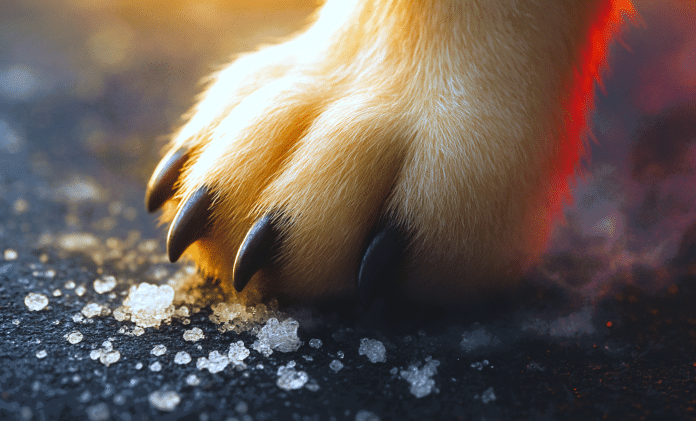Burlington, VT – As the first winter snows settle across Vermont, veterinarians are urging pet owners to protect their animals from an often-overlooked hazard on city streets and driveways: road salt and chemical de-icers. These products, used to prevent icy buildup, can burn paw pads, irritate skin, and cause toxic reactions if licked or ingested.
Common ice-melt compounds such as sodium chloride, calcium chloride, and magnesium chloride can dry and crack the skin on a dog’s paws. Once the irritation begins, dogs often lick their feet, which can lead to swallowing harmful amounts of the same chemicals.
Even small doses of salt can trigger vomiting, diarrhea, excessive thirst, and lethargy, and in severe cases, seizures or kidney failure. Repeated exposure through the winter can result in long-term damage to paw pads and internal organs. Some road salt mixtures also contain heavy metals and industrial contaminants, increasing toxicity risks for pets.
Veterinarians recommend washing a dog’s paws with warm water after every walk and drying them thoroughly. Applying a paw balm or wax beforehand can provide a barrier against salt, and trimming fur between the toes helps prevent buildup of snow and chemicals. Booties can offer additional protection for dogs willing to wear them. Pet owners are also advised to switch to pet-safe, chloride-free ice melts at home.
With freezing temperatures and snow accumulation forecast through the weekend, animal-care experts caution that even short walks across salted sidewalks can cause discomfort or burns. Observing for limping or licking after outdoor time can help owners catch early signs of irritation before it worsens.
As Vermont enters another cold season, veterinarians stress that the biggest threat to pets this weekend may not come from the chill in the air—but from what’s spread across the ground.





